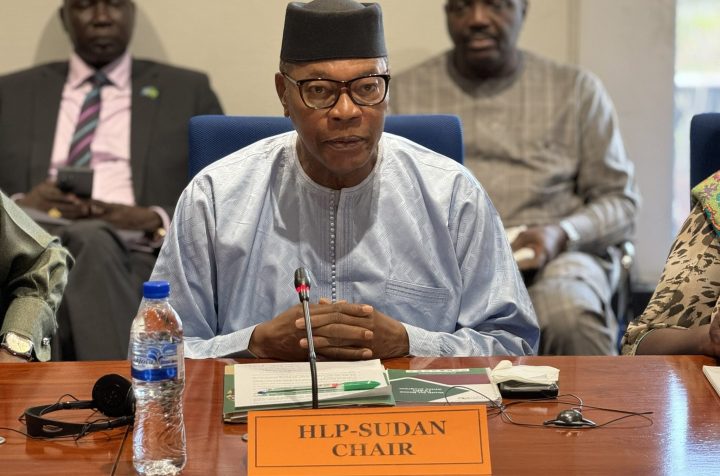ISS TODAY OP-ED
New panel on Sudan offers peace resolutions but faces multiple obstacles

Can the African Union’s new high-level panel succeed where other diplomatic efforts over the past year have failed?
Sudan’s 11-month civil war is arguably the worst internal conflict in Africa. Up to 14,000 people have died and the displacement crisis is the largest in the country’s history. At least eight million people have fled their homes and around 25 million — about half the population — need humanitarian assistance and protection.
The war has also reignited hostilities in historically unstable parts of Sudan, particularly Darfur and Kordofan, aggravating the volatile Horn of Africa and Central African regions.
Diplomatic efforts to negotiate peace between General Abdel Fattah al-Burhan’s Sudanese Armed Forces (SAF) and General Mohamed Hamdan ‘Hemedti’ Dagalo’s paramilitary Rapid Support Forces (RSF) are in disarray. Ongoing initiatives have been largely uncoordinated, bureaucratic and focused on gun-wielding belligerents to the exclusion of civilian representatives.
Read more in Daily Maverick: Sudan is being destroyed while the world focuses on Gaza and Ukraine
The African Union (AU) has been criticised for its inability to end the war. In a bid to turn things around, AU Commission Chairperson Moussa Faki Mahamat appointed a high-level panel on Sudan in January. Under the leadership of Mohamed Ibn Chambas, the panel will work with civilian and military forces, and regional and global actors, including the region’s Intergovernmental Authority on Development (Igad), United Nations (UN) and League of Arab States.
However, given the AU’s approach to the crisis thus far, many doubt that the panel can move the needle closer to ending this complex conflict. Several other AU and development partner efforts have so far largely failed.
The AU Peace and Security Council (PSC) has repeatedly condemned the fighting, calling for a ceasefire and inclusive dialogue, and urging Mahamat to engage the warring parties. The AU Commission developed the May 2023 roadmap for resolving the conflict and created a mechanism on Sudan and a core group to harmonise efforts by all actors.
However, these measures haven’t led to concrete engagements with Sudanese partners or reduced fighting between the two military forces. The most significant effort to date has been the Jeddah process driven largely by external stakeholders — but it too has failed to prevent the conflict from escalating.
African Union high-level panel
The new AU panel has several strengths. With members from Ghana, Uganda and Somalia, its regional diversity addresses perceptions in Sudan that Horn actors lack neutrality. Also, Chambas’ experience in Sudan — having headed the AU-UN Mission in Darfur — will increase the panel’s understanding of the complexities.
However, diplomats and observers question the panel’s political muscle and its ability to bring warring generals to the negotiating table. An Addis Ababa-based diplomat believed the panel’s weight could have been enhanced by including a sitting or retired head of state. Some analysts who requested anonymity said it was merely another AU attempt to appear to be taking action.
The ongoing battle for supremacy between the two generals and their military factions will complicate the panel’s ability to deliver. Sudan’s withdrawal from Igad, the SAF’s decision to leave talks and stage more offensives against the RSF, and recent RSF military advances in Wad Madani, Khartoum, and western Darfur could also frustrate peace efforts. And Hemedti’s reception by some African countries could spur Burhan to question African-led efforts, including those of the new panel.
The Addis Ababa declaration signed in January between Sudan’s former prime minister Abdalla Hamdok’s Coordination of Civil Democratic Forces and the RSF further dashes prospects for the panel’s work. While it proposes a roadmap for peace, excluding the SAF could be interpreted as a de facto legitimisation of the RSF amid intense contestation by both factions.
Despite the many obstacles it faces, the panel is a crucial AU-led effort that requires financial and political support from the AU Commission and external partners. This will help it to engage with regional and international actors and bring the generals and their factions to the table.
The formation of the panel is timely given Burhan’s resistance to Igad interventions and objection to talks with Hemedti. The panel should seize any opportunity to use quiet diplomacy with both generals to renegotiate conditions for a resolution. It should engage high-level stakeholders rather than rely on proxies and representatives, and could use the AU’s convening power to include broader Sudanese stakeholders, spoilers and funders of factions.
Through the panel and Igad, the AU should push for civilian participation in the Jeddah talks and focus not only on ceasefire negotiations and humanitarian assistance but on discussions on political issues. That could avoid past mistakes by providing a transitional government architecture and implementation plan based on citizens’ aspirations. DM
Hubert Kinkoh, Researcher, African Peace and Security Governance, Institute for Security Studies (ISS) Addis Ababa.
First published by ISS Today.

















 Become an Insider
Become an Insider
Comments - Please login in order to comment.